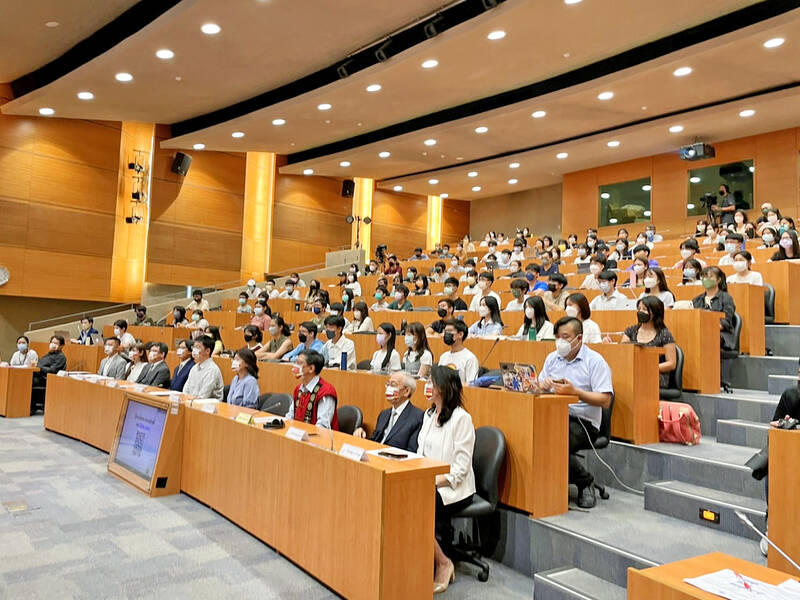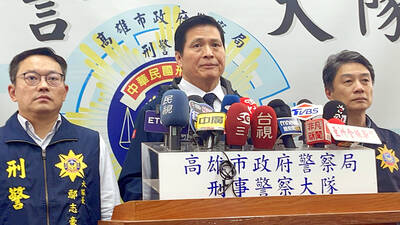If an upcoming referendum to lower the voting age to 18 from 20 is successful, it could encourage young people to become engaged in constitutional change, said Cheryl Saunders, the winner of this year’s Tang Prize in Rule of Law.
“I understand the difficulty of the turnout, that’s obviously significant in the Taiwanese context, but if you could just get it over the line, it would be a wonderful precedent,” Saunders said via teleconference at the opening of the Tang Prize Forum at National Taiwan University on Monday.
“It will energize and engage young people in constitutional change, which is very hard to do in many parts of the world,” said Saunders, a laureate professor emeritus at the University of Melbourne and constitutional law expert.

Photo: CNA
A successful referendum would make young people aware of the Constitution and the processes for change, Saunders added.
“It would have to be done in a way where apparently the political parties are both supportive, which is also not a bad culture to be setting,” she said.
The 113-seat legislature on March 25 voted 109-0 in favor of lowering the voting age, sending the issue to a national referendum, which is to be held in conjunction with local elections on Nov. 26. At least half of all eligible voters must vote in its favor for the amendment to pass.
Commenting on holding the referendum alongside local elections, the Central Election Commission has said that as the amendment enjoys a high degree of support from the ruling and opposition parties in the legislature, the referendum date “should take into consideration the effect of civic participation in constitutional reform.”
Election day would also be a public holiday, which would make it more convenient for people to vote, the commission has said.
“So, there is more at stake than just age limits, I think, in this coming referendum in Taiwan and I very much hope it is successful,” Saunders said.
Saunders said that 18 is a fairly normal age for the exercise of political rights.
“And that if anything, the pressure is downwards. So, there is now beginning to be discussion about dropping the age limit to 17 or 16 in countries around the world,” she said.
Saunders in June received the Tang Prize in Rule of Law for her “pioneering contributions to comparative public law, in particular, her work on constitution-building in the Asia-Pacific region,” said the Tang Prize Foundation, which has organized the awards every two years since 2014.
Born in 1944 in Quetta, which was then part of British-ruled India, Saunders moved with her family to Melbourne, Australia, at the age of five and has called the city her home ever since.
Saunders, 78, has taught at the University of Melbourne, her alma mater, for more than three decades and served as the founding director of its Centre for Comparative Constitutional Studies.
She began her academic career in Australian constitutional law, but later expanded her expertise to comparative public law, including comparative constitutional law and methods, intergovernmental relations, and constitutional design and change.
She was made an Officer of the Order of Australia in 1994 for her services to the law and public administration, and was honored with the Australian government’s Centenary Medal in 2003 for her “service to constitutional law and as president of the Administrative Review Council.”
She is the editor of the Public Law Review journal and in 2011 wrote The Australian Constitution: A Contextual Analysis.
Saunders is the fourth individual winner of the Tang Prize in Rule of Law.

Twenty-four Republican members of the US House of Representatives yesterday introduced a concurrent resolution calling on the US government to abolish the “one China” policy and restore formal diplomatic relations with Taiwan. Led by US representatives Tom Tiffany and Scott Perry, the resolution calls for not only re-establishing formal relations, but also urges the US Trade Representative to negotiate a free-trade agreement (FTA) with Taiwan and for US officials to advocate for Taiwan’s full membership in the UN and other international organizations. In a news release announcing the resolution, Tiffany, who represents a Wisconsin district, called the “one China” policy “outdated, counterproductive

Actress Barbie Hsu (徐熙媛) has “returned home” to Taiwan, and there are no plans to hold a funeral for the TV star who died in Japan from influenza- induced pneumonia, her family said in a statement Wednesday night. The statement was released after local media outlets reported that Barbie Hsu’s ashes were brought back Taiwan on board a private jet, which arrived at Taipei Songshan Airport around 3 p.m. on Wednesday. To the reporters waiting at the airport, the statement issued by the family read “[we] appreciate friends working in the media for waiting in the cold weather.” “She has safely returned home.

ON PAROLE: The 73-year-old suspect has a criminal record of rape committed when he was serving in the military, as well as robbery and theft, police said The Kaohsiung District Court yesterday approved the detention of a 73-year-old man for allegedly murdering three women. The suspect, surnamed Chang (張), was arrested on Wednesday evening in connection with the death of a 71-year-old woman surnamed Chao (趙). The Kaohsiung City Police Department yesterday also unveiled the identities of two other possible victims in the serial killing case, a 75-year-old woman surnamed Huang (黃), the suspect’s sister-in-law, and a 75-year-old woman surnamed Chang (張), who is not related to the suspect. The case came to light when Chao disappeared after taking the suspect back to his residence on Sunday. Police, upon reviewing CCTV

TRUMP ERA: The change has sparked speculation on whether it was related to the new US president’s plan to dismiss more than 1,000 Joe Biden-era appointees The US government has declined to comment on a post that indicated the departure of Laura Rosenberger as chair of the American Institute in Taiwan (AIT). Neither the US Department of State nor the AIT has responded to the Central News Agency’s questions on the matter, after Rosenberger was listed as a former chair on the AIT’s official Web site, with her tenure marked as 2023 to this year. US officials have said previously that they usually do not comment on personnel changes within the government. Rosenberger was appointed head of the AIT in 2023, during the administration of former US president Joe